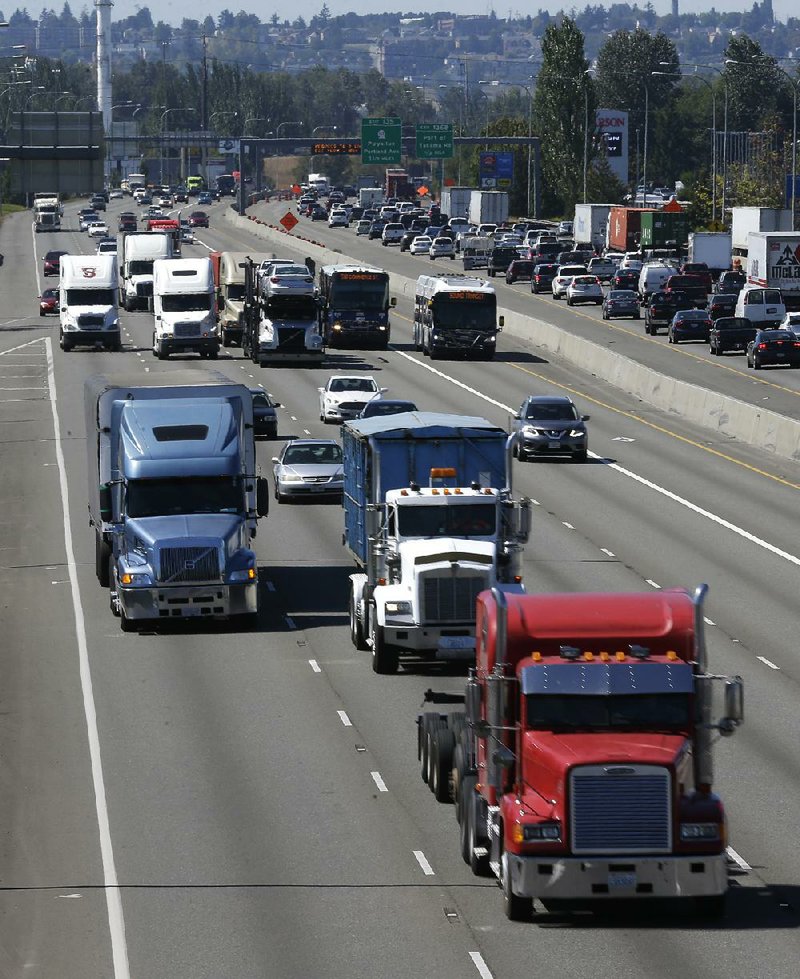The federal government has issued a proposed rule requiring heavy-duty vehicles to be equipped with devices that would limit their speed on U.S. roadways, a measure it believes will help save lives and more than $1 billion in fuel costs each year.
The long-awaited proposal was released Friday by the National Highway Traffic Safety Administration and Federal Motor Carrier Safety Administration. It will require the speed-limiting devices to be set at a maximum speed, but did not include specifics.
Benefits of setting the maximum speed at 60, 65 or 68 mph are outlined in the proposal. Other speed limits will be considered based on a public-comment period that will open once it is published in the N̶a̶t̶i̶o̶n̶a̶l̶ ̶R̶e̶g̶i̶s̶t̶e̶r̶ Federal Register.*
"There are significant safety benefits to this proposed rulemaking," U.S. Transportation Secretary Anthony Foxx said in a statement. "In addition to saving lives, the projected fuel and emissions savings make this proposal a win for safety, energy, conservation and our environment."
The proposal is the next step in what has been a long process regarding speed limiters.
The American Trucking Associations first petitioned the National Highway Traffic Safety Administration and the Federal Motor Carrier Safety Administration to mandate a maximum speed limit a decade ago. The government initiated the process in January 2011.
After years of bureaucratic delays, the White House Office of Management and Budget signed off on the rule Aug. 12. The proposed rule released Friday will require new trucks, buses and multipurpose passenger vehicles weighing more than 26,000 pounds to come equipped with the devices.
The American Trucking Associations said it believes the speed limiters are an important step in improving highway safety. The group previously cited federal data that blamed high speed in 18 percent of all fatal crashes in which large trucks were at fault. Last year, the organization said 70 percent of trucking companies already used speed limiters.
"Speed is a major contributor to truck accidents and by reducing speeds, we believe we can contribute to a reduction in accidents and fatalities on our highways," Chris Spear, the trucking group's chief executive, said in a statement.
Of Arkansas' four public trucking companies, ArcBest Corp. restricts road trucks to 63 mph and USA Truck keeps the maximum speed set at 65 mph. P.A.M. Transportation Services Inc. sets its trucks at a maximum 62 mph on the pedal and up to 64 mph on cruise control.
J.B. Hunt Transport Services Inc. did not provide its speed-limiting policy.
Stallion Transportation Group of Beebe implemented a 65 mph limit on its drivers six years ago. Butch Rice, president and CEO of Stallion and chairman of the board of the Arkansas Trucking Association, said it's a simple matter of money.
"As a truck owner you want to save as much money as you can on fuel," Rice said. "A 65 mph speed limit? That's fuel savings right there."
But Rice does believe the effects of the rule will be visible on the highways.
"It's going to affect everything. It's going to congest the industry even more," Rice said. "Personally, I think you're going to have 20 trucks running all bunched up together on the highway, instead of the three or four you see now."
While the American Trucking Associations has remained steadily in favor of the rule, the Owner-Operator Independent Drivers Association has been against the use of speed limiters.
In a previously filed petition, the independent-owners group argued speed limiters create an "artificial and unsafe speed differential between trucks and other highway users." The association also added: "Faster-moving cars sharing the road with slower-moving trucks create an increased likelihood for collisions as other vehicles compete to pass speed limited trucks and attempt to enter or exit highways."
The group -- which represents small-business truckers -- reiterated its stance in a statement Friday, saying the proposal "would be dangerous for all highway users." The devices, according to the Owner-Operator Independent Drivers Association, would take control out of the hands of drivers in situations requiring acceleration.
"No technology can replace the safest thing to put in a truck, which is a well-trained driver," the group's executive vice president, Todd Spencer, said in a statement.
Spear, of the American Trucking Associations, said the industry can't be afraid of technology, but also must make sure it has proven benefits. Companies already using speed limiters have found significant safety, fuel efficiency and equipment life-span benefits with little to no negative effect on productivity, according to Spear.
Bill Davis, president of Bill Davis Trucking in Batesville, said he supported the measure because it's a "good idea from an emissions standpoint, for the safety of the American public and for the safety of the drivers." Davis, whose company runs 75 trucks, said the transition to speed limiters could lead to inconveniences, but added "it wouldn't be insurmountable."
"The benefits outweigh it," Davis said.
Business on 08/27/2016
*CORRECTION: The Federal Register will publish comments on a proposed rule requiring heavy-duty vehicles to be equipped with devices that would limit their speed. The publication’s name was wrong in this story.

